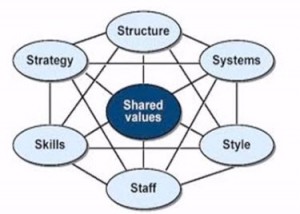Peters and Waterman published In Search of Excellence in 1982. It had a profound impact on the direction of my life but that’s not important. What is important is the 7-S model that they revealed in that publication remains today, one of the mainstay’s of the McKinsey consulting methodology.
I recently did a podcast interview with August Aquila, a well known and respected consultant to the profession in North America, the UK and India. August and I were discussing the challenges leaders of accounting practices have and how they often have particular difficulty understanding why a performance improvement initiative they heard about at a conference from a colleague worked for “that” firm but when they tried it in their own firm it did not work. Click here to visit the podcast archive on MyPracticeMentor.com
 August’s view is the reason for that is the initiative or technology or whatever is not the solution. The solution has more to do with the culture in which it is introduced and with how it fits with all the other elements of the firm’s value chain (my words). I agree with him. Way too often business leaders look longingly at what other firms are doing and focus their attention on the technology rather than the fit.
August’s view is the reason for that is the initiative or technology or whatever is not the solution. The solution has more to do with the culture in which it is introduced and with how it fits with all the other elements of the firm’s value chain (my words). I agree with him. Way too often business leaders look longingly at what other firms are doing and focus their attention on the technology rather than the fit.
This is not to say the technology is unimportant but unless it aligns with all the other elements and in particular the so-called “soft” elements of the business disappointment is usually the outcome. This is what led Peters to spend, in his words, the rest of his consulting life reminding people that hard (strategy, structure, systems) is easy and soft (skills, style,staff and shared values) is hard.
In Search of Excellence drew quite a lot of criticism on various levels including the fact that many of the companies spotlighted as being excellent turned out not to be. There was also some suggestion that the data was rigged and perhaps the “research” was not as rigorous as it might have been. I don’t intend to buy into any of this because I simply don’t know but what I do know is the fact that I have never seen any criticism of the 8 characteristics that were identified as being evident in the “excellent” companies.
I summarize them here for you to form your own opinion:
- A bias for action
- Close to the customer
- Autonomy and entrepreneurship
- Productivity through people
- Hands-on, value-driven – management philosophy
- Stick to the knitting
- Simple form, lean staff
- Simultaneous loose-tight properties
